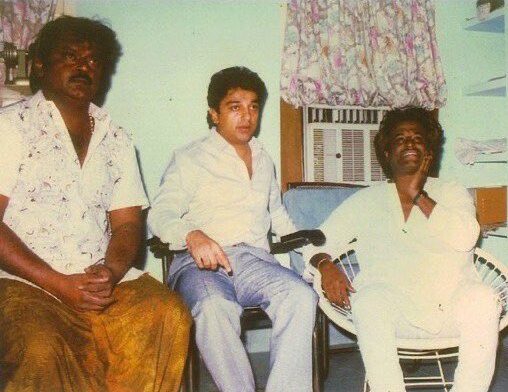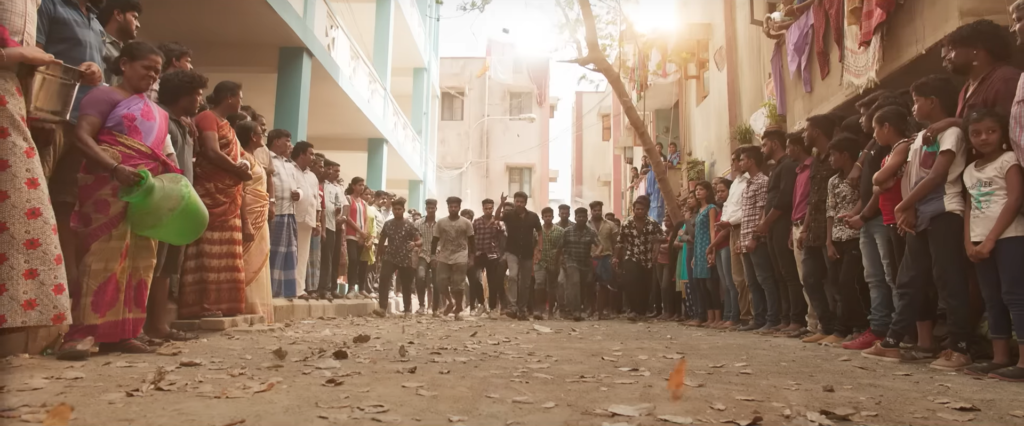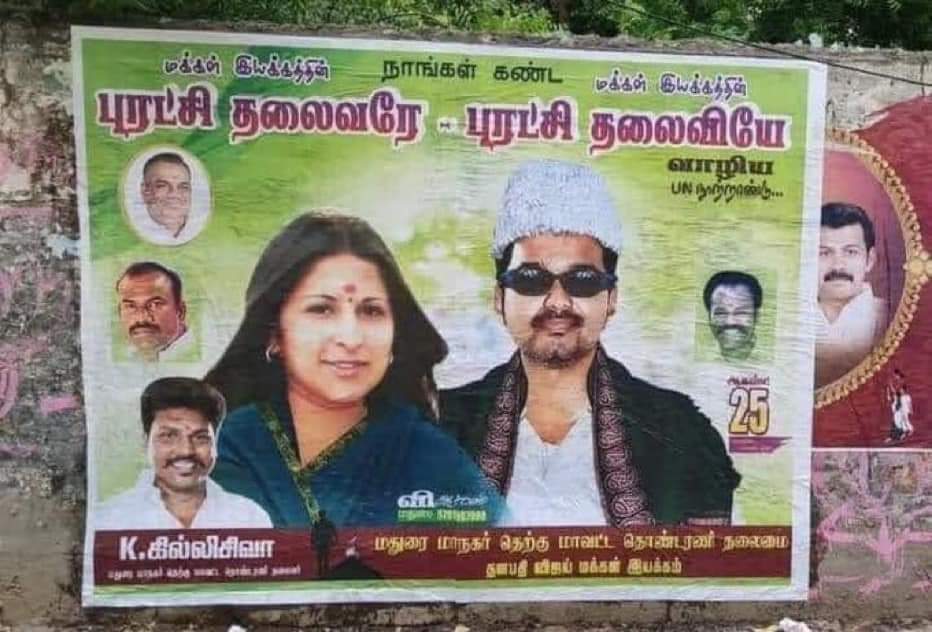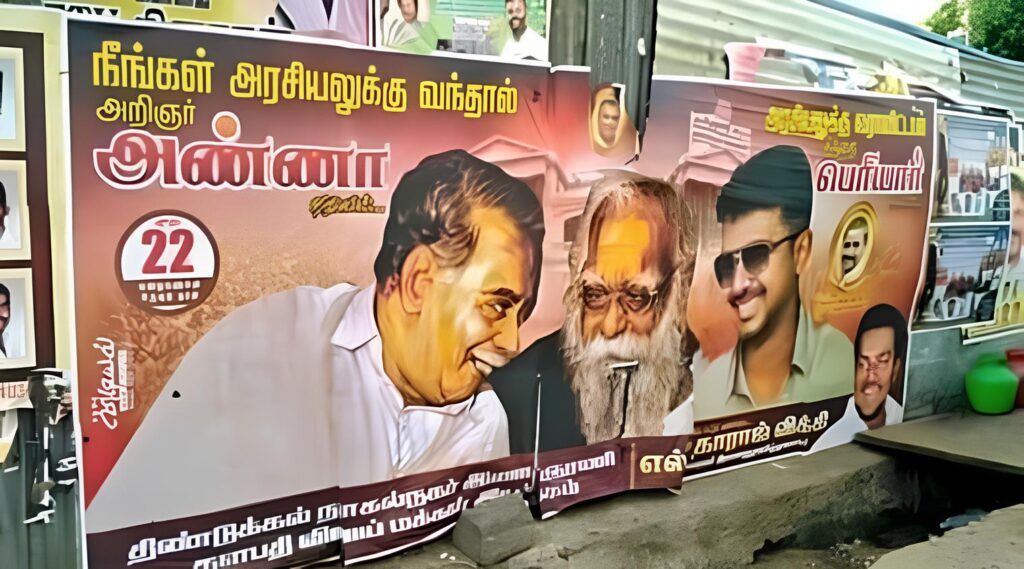“Film has become increasingly pervasive in almost all aspects of Tamil society and perhaps most prominently in political life.”
— Robert L Hardgrave (1973)
Following the legacy of film stars-turned-politicians, the actor Vijay has prepared his ground for his political entry in Tamil Nadu. Ending all the speculations of his plunge into mainstream electoral politics, the actor has officially announced his political party and named it Tamilaga Vetrri Kazhagam (Tamil Nadu Triumph Federation), and the party will contest the 2026 Tamil Nadu State Assembly Election. Being an avid fan of MGR, mirroring his mannerisms, dialogues, and songs and projecting him as a friend of the proletariat, will Vijay’s ‘MGR Formula’ pay off his dream of becoming a chief minister? Can he formulate new policies for transforming Tamil society besides promising the usual anti-corruption and egalitarian rule? Will he be able to sustain in politics with his star image and fan base?
In Tamil Nadu, cinema has a symbiotic relationship with politics, an inseparable phenomenon. Following the legacy of celebrated political careers of cine-stars turned politicians, actor Vijay has geared up his political journey, which is much expected and anticipated in the Tamil political setting. Announcing his political party, Tamilaga Vettri Kazhagam (Tamil Nadu Triumph Federation), the most popular and highest-paid actor in Kollywood, is officially signalling the beginning of his political career. Notably, in recent times, other pre-eminent film stars such as Rajinikanth and Kamal Hassan have announced their political entry in 2017 and 2018, respectively, but failed to transform their stardom into a successful political career. Now, both the film industry and the political milieu of Tamil Nadu are awaiting the official release of Vijay’s neta role that he has scripted so far in his successful film career over the last four decades.

Apart from his on-screen political statements, the actor’s off-screen activities for over a decade indicated his concomitant political entry. Various media reports indicated that the actor had initially planned to make his political debut in 2021 ahead of the Tamil Nadu assembly election but put back on after actor Rajinikanth’s political foray. As Rajinikanth has fully receded from electoral politics, much speculation around his political plunge became even more evident in the last three years as an alternative to the well-established Dravidian political forces.

Uniquely, among the other political parties in India, the two major political forces such as Dravida Munnetra Kazhagam (Dravidian Progressive Federation, DMK) and All India Anna Dravida Munnetra Kazhagam (Anna Dravidian Progressive Federation, AIADMK) in Tamil Nadu have used the potential of cinema and star-image for its political success. Since their inception, these parties have been leveraging film stars and songs to propagate their political influence and garner support for elections, a strategy that continues to be employed to this day. Historically, the Dravidian patriarchs such as C N Annadurai and M Karunanidhi, the notable Tamil writers and orators, have used both drama and cinema as their propaganda vehicles to strengthen the Dravidian ideology in early times. Similarly, the triumphant political careers of cine-stars-turned-politicians like M G Ramachandran (MGR) and J Jayalalitha, who served as Chief Ministers of Tamil Nadu until their death, utilized cinema for building and maintaining their political image. Even many pre-eminent actors of this period, such as S S Rajendran, K R Ramasamy, N S Krishnan, M R Radha and Sivaji Ganesan, pursued their political interest but failed to achieve the same level of success as MGR’s meteoric rise in politics.

In later years, the line-up of star image and popularity had extended to actor Rajinikanth. Many media reports state that, in 1996, Rajinikanth had the momentum to plunge into politics as an alternative power in the Tamil electoral political setting. While speculations of his political entry persist, the actor supported the DMK and Tamil Maanila Congress (TMC) coalition against the Jayalalitha-led AIADMK in the 1996 State Assembly election. But thereupon, the actor used his films to lively impetus his political indication in Tamil Nadu. In the 2004 general election, Rajinikanth lent his support to the AIADMK-BJP coalition, which exhibited his contrary political and ideological standpoint.
The political entry of actor Vijayakanth in 2005 through founding his political party Desiya Murpokku Dravida Kazhagam (DMDK) ahead of the Tamil Nadu State Assembly election in 2006 was instrumental in the Tamil political scene. But the party has secured only one seat out of contesting in all 234 constituencies, from the Virudhachalam constituency, where Vijaykanth had contested and became a MLA in the first attempt. Even though the party had secured a place as an opposition party in the subsequent polls, it led to a successful beginning delineated to a declining zone in later stages. Furthermore, other film actors such as Sarathkumar, K Bhagyaraj, T Rajender, and S. Ve. Shekher entered politics in Tamil Nadu but have not been as successful in arriving at the mainstream.
The Political Vacuum
The demise of J Jayalalitha and M Karunanidhi, the two pre-eminent Dravidian leaders, has left a political vacuum in Tamil Nadu. Even though there are many other star politicians and political parties which is currently active, such as the recently demised actor Vijaykanth’s DMDK, Sarath Kumar’s All India Samathuva Makkal Katchi (AISMK), and Seeman’s Naam Tamizhar Katchi (NTK) failed to fill the vacuum, and it extended to the entailing origination of an alternative non-Dravidian political force. At this time, actor Kamal Hassan announced his non-Dravidian-centrist party, Makkal Needhi Maiam (MNM), in 2018 and contested in the 2019 Lok Sabha and 2021 State Assembly elections, securing less than 5% votes.

Followingly, after a long suspense on his political entry in 1996, Rajinikanth announced his Aanmeeka Arasiyal (Spiritual Politics) on 31 December 2017. He planned to launch his political party, Rajini Makkal Mandram (RMM), a fan club turned party in January 2021, aiming to contest the Assembly election in the same year. However, he withdrew entirely from politics, citing personal health reasons. The unsuccessful political careers of Kamal Hassan and Rajinikanth’s ‘political quit’ left the political vacuum alive in the state. Recently, this led to a new discussion on the dysfunction of star image and popularity in building remarkable political careers. Amidst this debate, actor Vijay announced his political plunge and named the party Tamilaga Vettri Kazhagam (Tamil Nadu Triumph Federation) in the vein of star image and politics.
Tamilaga Vettri Kazhagam (TVK) or Thalapathy Vijay Kazhagam
Actor Vijay, known by his screen name Thalapathy (Commander), officially announced his political entry through his founding party, Tamilaga Vettri Kazhagam (TVK), on February 02, 2024, which reminded the actor’s debut film Vetri released in 1984. Ending all the speculations of his plunge into mainstream electoral politics for more than a decade, the actor decided to contest in the 2026 Tamil Nadu State Assembly Election. Over the last decade, Vijay has shown a keen interest in politics through his onscreen and off-screen activities. In 2009, the actor founded Vijay Makkal Iyakkam (VMI, Vijay People Organization), a fan-club-turned organization for welfare activities to cultivate a political image from the grassroots level. Parellaly, since 2010, the actor has vehemently expressed his political stance through movie dialogues and anecdotes, speeches at audio launches and success celebrations. This led to numerous controversies and political pressures during the release of these films.

It is to be noted that the actor Vijay, arguably the highest-paid artist in Tamil cinema, has declared his political entry at the peak of his cinema career, which is quite interesting. Spanning a successful career for four decades in Tamil cinema, Vijay’s films were a mix of romance and action in the initial decade. Later, he started doing power-packed action films and began playing the roles of an honest police officer, a patriotic army man, an advocate, a bureaucrat, and other characters who worked in support of the state’s power structure. In recent times, few of his films have featured semi-revolutionary characters who question the nature of the state’s functioning, fight against corruption and caste, and impart progressive ideologies. Thus, through leveraging his stardom and fanbase, the actor has also initiated plans to embark on his political journey beyond the realm of cinema.
In the contemporary political vacuum of Tamil Nadu, other than DMK and AIADMK, born from the parent party Dravidar Kazhagam (DK) founded by E V Ramasamy Periyar, there is no other political party in the Dravidian lineage at the forefront. This gap paved even more space in the vacuum with an increased need for an alternative political force, which is largely expected as a non-Dravidian party for the position. In the current political situation of Tamil Nadu, the state has a multilateral contest for political power, among which the current ruling party, the DMK, which became all-powerful under M K Stalin, the AIADMK, which aims to regain its power after multiple factionalism, and the BJP, which is trying to form a third front. Now, the actor Vijay has also announced his political party in this vein and positioned himself as an alternative-non-Dravidian force.
In a three-page official statement, starting with the line “Pirapokkum Ella Uyirkkum,” from Thirukkural, which roughly translates to “All are equal by birth” as the slogan of the party, the founder-president of TVK, the actor Vijay stated that “Vijay Makkal Iyakkam has been doing various welfare schemes, social services and relief assistance to the best of its potential for many years. However, a voluntary organization alone cannot bring complete socio-economic and political reforms. It requires certain political power for its full-swing activities in a broader sense.” As the party’s initial policies, the actor has promised to take on corruption and divisive politics in the name of religion and caste, and their politics must adhere to the political traditions of the State, the egalitarian Tamil culture, and the Indian Constitution. These regular policies are ubiquitous in the statements of all the newbie political parties, indicating that the party has no new pathway and only focuses on stardom to harbour political gain. However, there are many guesses that, for the time being, the party’s political and ideological stance may have been kept under wraps.

In the statement, the party has decided to avoid the 2024 Lok Sabha elections, will not extend support to any political parties, and will focus on politicizing its cadres and establishing its internal infrastructure. As the party has decided to contest in the Tamil Nadu State Assembly election 2026, it may observe the Lok Sabha polls and monitor the political climate to govern the direction in the interim period. Being a political party that primarily seeks fan clubs’ support for its political establishment, it is challenging to politicize a fan into a political activist or cadre and make them mobilize to practice politics in the mainstream political realm, which is a big question that remains unanswered.
So far, Tamilaga Vettri Kazhagam has not confirmed its political position or ideological principles unless “Tamil Nadu-centric ideology” is mentioned in the actor’s statement. Reportedly, the party will affiliate with progressive, Dravidian or leftist political ideologies, as the actor has mentioned reading extensively about leaders like Ambedkar, Periyar, Kamaraj and Abdul Kalam. However, being a party founded and to be contested from Tamil Nadu, the TVK does not have any mention of Dravida or Dravidian in the party name. Usually, the names of all the established political parties in Tamil Nadu, following the supreme Dravidian parties DMK and AIADMK, had the term Dravida or Dravidian in them.
This denotes that the actor’s party may have aimed to function as an alternative force by not choosing the path of the two Dravidian majors— the DMK and the AIADMK. Because political parties like Tamizhaga Munnetra Munnai (TMM), Thayaga Marumalarchi Kazhagam (TMK) Ahila India Naadalum Makkal Katchi (AINMK), All India Samathuva Makkal Katchi (AISMK) Mukkulathor Pulipadai, Naam Tamizhar Katchi (NTK), Makkal Neethi Maiam (MNM), and Rajini Makkal Mandram (RMM) were formed with non-Dravidian principles aiming to replace the Dravidian political forces, have titled without Dravida or Dravidian in their party’s name.
Vijay’s On-screen and Of-screen Politics
Being an avid fan of MGR, who revolutionized the Tamil land with cinema and politics, actor Vijay pursued MGR’s charisma for films and made him a lodestar for his politics. He started mirroring MGR’s mannerisms, dialogues, and songs and projecting him as a friend of the proletariat. Also, he has subtly employed a ‘commercial cinema pattern’—filled with action, dance, songs and romance, as a vehicle for his political messages. Vijay mimicked the body language and mannerisms of MGR and deified him in many of his films, such as Youth (2002), Vaseegara (2003), Villu (2009), Vettaikkaran (2009), Sura (2010) and Bairavaa (2017), Mersal (2017), Bigil (2019), Master (2021). Since the release of Mersal (2017), the actor who was known by his epithet Ilaya Thalapathy (Young Commander) has changed to Thalapathy (Commander), similar to the way when Puratchi Thalaivar (Revolutionary Leader) MGR became the Makkal Thilagam (People’s Star), who had devoted bonding with the people even after attaining the stardom. Currently, Vijay is endeavouring to portray himself as MGR or a modern incarnation of MGR. This is evident in Vijay’s film “Master” (2021), where a song includes the lyrics “Vaathiyaar-u Thalapathy,” translating to “who is the Vaathiyaar, the teacher (or master), it is Thalapathy”. MGR was known as Vaathiyaar (Teacher or Master), and Vijay is seeking to personify MGR through numerous references.

Source: Facebook
On-screen, the actor Vijay has manifested his political outlook through criticisms of the union and state governments through his films. His aspiration to become a leader for the commons is shown in the films Thalaivaa (Leader, 2013) and Sarkar (Government, 2018); the actor’s character comes close to becoming the chief minister. Likewise, his films such as Kaththi (Knife, 2014), Mersal (Zapped, 2017) and Sarkar (Government, 2018) have made many controversies criticizing the government and their unsuccessful policies, scams, corruption, underdevelopment and freebies schemes, have faced many challenges for their theatrical release and expurgated many scenes even after their releases as well. These controversies have resulted in many loud protests and disagreements in the political climate of both union and state governments. Even more, the actor has undergone two income tax raids as an alarm from the ruling powers.
Source: YouTube
Off-screen, the actor has extended his support and marked political statements in many instances in the state and the centre, leaving much political guesswork. In 2009, the actor Vijay met Rahul Gandhi, which garnered speculation of his support for the Congress party. In 2011, he supported Anna Hazare’s ‘India against Corruption’ fasting movement in Delhi. In the same year, he also condemned both the union and state governments for their ignorant attitude toward taking action against the continuing attack on Tamil Fishermen by the Sri Lankan Navy force. In other instances, like the pro-Jallikattu protest in 2017, he stood anonymously with the protesters, representing solidarity. In the same year, he also visited, solicited, and gave financial aid to the family of Anitha, a medical aspirant who killed herself, proving his sensitivity to social and political issues. In 2018, he consolated the family members of 13 Tuticorin firing victims with a relief amount of one lakh rupees for each family. In 2021, the actor bagged media prominence as he pedalled through the streets of Neelankarai in Chennai to reach a polling booth to cast his vote in the state assembly election.

Over the last decade, the actor Vijay has implemented many schemes and welfare activities under the banner of VMI to function in ground-level support, like education and food for the underprivileged, and organizing blood donation and eye donation camps. The actor has also distributed relief materials for the Kerala flood and Gaja-cyclone-affected regions in Tamil Nadu. Recently, he felicitated the class 10 and 12 government school students from 234 assembly constituencies who performed outstandingly in board exams. Through VMI, the actor has requested his organization members to volunteer with the government to help the affected people in the recent Chennai flood. Also, he distributed relief materials for the flood-affected areas of southern Tamil Nadu. Furthermore, through his organization members, he initiated the activities to launch evening learning centres named Thalapathy Vijay Payilagam and a library named Thalapathy Noolaham to benefit students in all constituencies.

Actor Vijay has aimed the strength of his fan clubs, stardom and popularity for his political career. But, the formula was unsuccessful in the political careers of Kamal Hassan and Rajinikanth, who failed to maintain ideological clarity in their parties. The failure of these individuals in the political arena did not impact their careers in cinema. This precedent might be encouraging Vijay to view cinema as a fallback option if politics does not yield the desired results. However, for Vijay, his Vijay Makkal Iyakkam (VMI) has secured a significant percentage of the vote in both rural and urban local body elections in 2021 and 2022. This serves as a litmus test, demonstrating the party’s reception in various rural and urban pockets. This vote share indicates that the actor’s political entry may influence the vote percentage and also have the possibility of becoming an alternative force in Tamil electoral politics.

For superstars of Tamil Nadu, politics is an almost certain trajectory. The long lineup of Tamil film stars who ventured into politics and transformed their fan following into electoral support reveals both triumphs and defeats. Tamil Nadu, a state that experienced cine stars ascending to power for decades, also boasts a political landscape where the superstars have been overlooked, despite maintaining their status as superstar icons. Being a die-hard follower of MGR, will Vijay’s ‘MGR Formula’ pay off his dream of becoming a chief minister? Will it be possible for Vijay to offer a political regime to people similar to the eponymous rule of MGR? Can he formulate new policies for the transformation of Tamil society other than promising the usual anti-corruption and egalitarian rule? Will he be able to sustain in politics with his star-image and fan base? Let see.




I like how you have addressed the nuances of Vijay’s mannerisms right from 2002 and how it reflects MGR’s body language etc..Also you have thoroughly explored his offscreen representation on various socio-political issues which not many have addressed so far. It adds depth to the narrative. And the images are just on point to the article… Congratulations Deivendra Kumar